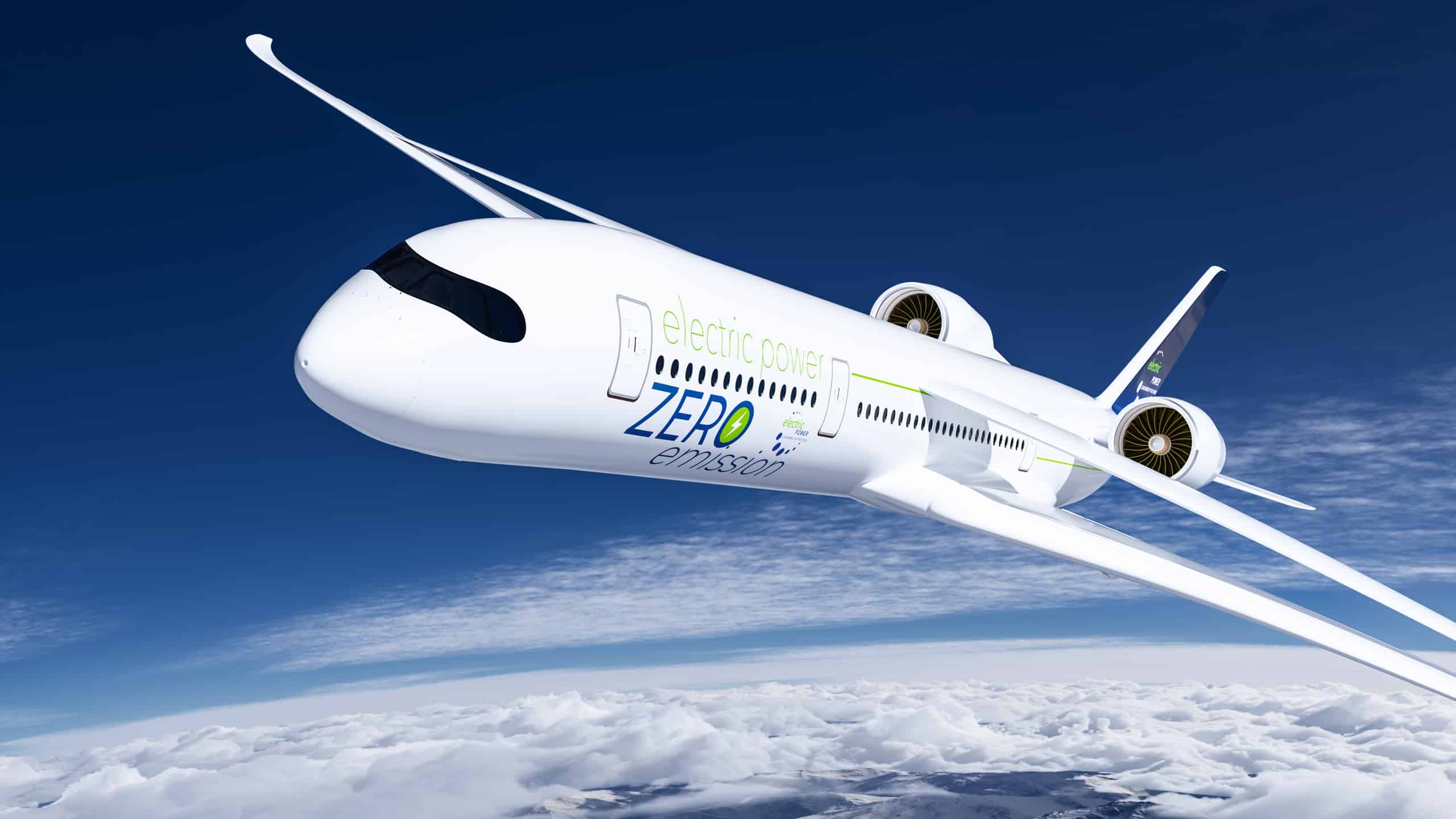Europe wants to become the first climate-neutral continent. According to an EU communiqué published on 6 February 2024, CO2 emissions are to be reduced by 90 % by 2040 compared to 1990 levels. Transport and the construction sector are key sectors in this endeavour.
The need to rethink
Back in 2011, the European Commission decided in Flightpath 2050 specifically for air traffic that CO2 emissions should be reduced by 75 % by 2050 compared to the year 2000. However exactly the targets are quantified and scheduled: Aviation must face up to the challenges of climate change with great urgency.
In view of the strong growth in air traffic, such a strong reduction in emissions as envisaged by the EU can probably only be achieved with electric drives. One possible alternative would be hydrogen drives, but the hoped-for technical breakthroughs have not materialised in recent years. Although conventional propulsion systems have become increasingly effective over the years and have made a significant contribution to CO2 savings (a reduction in paraffin consumption to three litres/passenger/100 km has already been achieved in some cases for long-haul flights), electric propulsion systems offer the greatest potential for a quantum leap towards climate neutrality. The solutions are diverse and range from distributed drives and hybrid drives to more effective battery storage and fuel cell systems. Their development has made great progress in recent years. The first small aeroplanes can already take off electrically. Drones, some of which can carry loads of several hundred kilograms, are already flying almost exclusively with electric drives. Can the development towards electric cars also be realised in air traffic? Does the future belong to electric aircraft? Noise and a range of pollutants can also be reduced with electric drives.
drastically.
Pioneers in Norway and opportunities for Germany
Norway in particular is a pioneer in the development of small electric aircraft, where mobility by car and train is usually very arduous due to the fjords and small aircraft are often sufficient due to the low population density. The aim is for all short-haul aircraft there to be electric by 2040. A start-up company is already in the process of developing prototypes and testing them with simulators. The high-wing aircraft called Noemi ("No-Emissions") is due to land on the fjords of the west coast in 2030. Scandinavia could become a pioneer of green aviation. Norway is not alone: the electrically powered Airbus E-Fan 1.0 already crossed the English Channel in 2015. It is expected to be ready for series production by 2035.
But what developments are taking place to make this concept attractive for Germany as well? As in most European countries, electric flying will only be ecologically attractive here on a broad scale if it can be used to cover medium distances for not too few passengers. Only then will it compete with fossil-fuelled flights and not the railways. For us, the priority option would be to shift short-haul flights to rail. For the ethical evaluation of electric flying, it needs to be categorised within comprehensive concepts of sustainable mobility. Plans that make sense for Scandinavia cannot be transferred 1:1 to Germany.
Medium-range flights would require a leap in battery development, which currently weigh 60 times as much and have many times the volume of paraffin, whose energy density is far superior. We need physical inventors who can put together the possible synergy effects of many small detailed improvements as if they were a jigsaw puzzle, while also keeping an eye on the enormous safety problems that are essential for flying. In Mr Myschik, we have one such tinkerer and leading expert
for the sustainable, efficient and safe operation of future aviation applications among us.
Weighing up interests with a sense of proportion
I am certain that flying will play an indispensable role in a globalised world that relies on international communication and the flow of goods. That is why I am not an environmental ethics rigorist who categorically rejects flying. For me, weighing up the benefits with a sense of proportion is often the most serious ethical issue. Despite the ecological downsides, flying is often the lesser evil. Flying is the fuel of the modern economy and many areas of our civilisation. But in my opinion, technical innovations are only part of the solution to the problem. We also need a reduction in flights, be it in tourism, which in the academic world generates enormous CO2 emissions in the form of conference tourism, or by avoiding the senseless transport of goods. I am in favour of a double decoupling: technically through efficiency improvements and new drive systems that enable the same level of prosperity with less environmental consumption, and culturally through a change in values and sufficiency that reduce mobility to the unavoidable level through frugality. Without the virtue of moderation and a rediscovery of quality of life through proximity and regionalisation (for example of holiday resorts and food supply), we will not be able to achieve the goals of sustainability.
There is often considerable resistance to such a change in values, which affects everyone. It is uncomfortable. Particularly from the perspective of Christian social and environmental ethics, I am in favour of an appreciation of technical innovations and a basic trust in scientific and technical creativity. But not if this serves as a substitute for an eco-social change in values. Only a double decoupling of prosperity development and environmental consumption, both technically and culturally, can generate the necessary dynamics of the "Great Transformation" towards a post-fossil society. Today we are focussing on the technical side. For Christian ethics in particular, there is a need to catch up on linking responsibility for creation more closely with the joy of discovery, technical creativity and entrepreneurial innovation.
